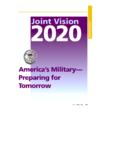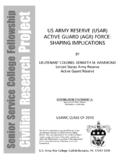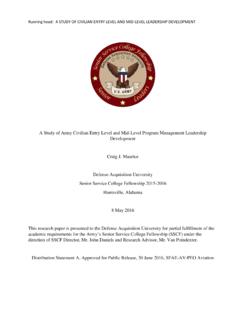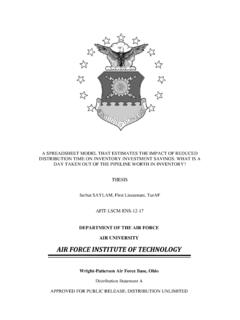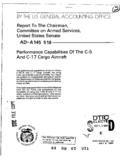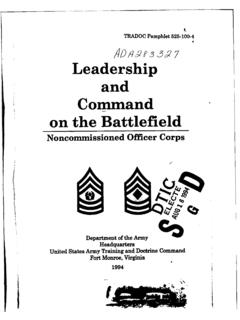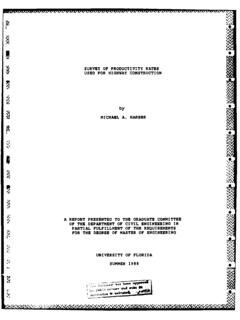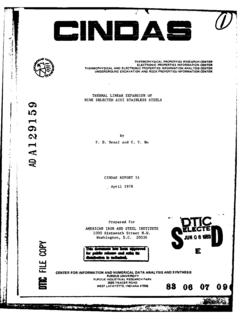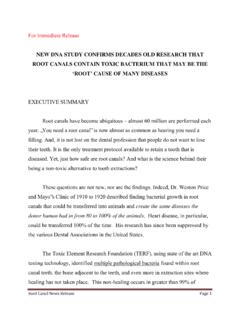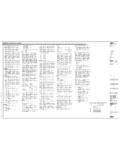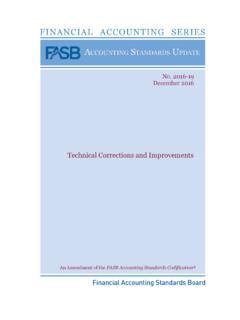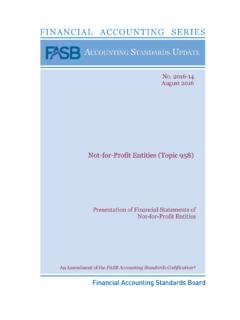Transcription of Naval Innovation - Defense Technical Information …
1 Technology is often cited as a key aspectof the revolution in military affairs anda decisive factor in military operationstoday. A study of the transition by theRoyal Navy from coal to oil, stimulated by FirstLord of the Admiralty Winston Churchill and Ad-miral Sir John (Jacky) Fisher, reveals a more com-plex story. Although technological change was agreat success every navy soon switched to oil itdid not constitute a strategic advance for was an achievement that represented a graverisk to a nation which possessed large coal re-serves but no oil. This example suggests howtechnological innovations alone do not spark arevolution in military of a TechnologyWhen Churchill went to Whitehall in 1911,coal was still the primary source of power fornaval vessels.
2 The Royal Navy had adopted oil forsubmarines and destroyers, and in most ships itwas sprayed on coal to increase its coal remained the principal fuel, especiallyfor larger vessels like battleships. It was widelyavailable, especially in Britain, where Cardiff coalmined in Wales was preferred by navies world-wide. Coal was accepted by marine engineers,50 JFQ/ Winter 2000 01 Commander Erik J. Dahl, USN, teaches at the Naval War College andpreviously was assigned as chief of the indications and warning branchat Headquarters, Forces Coal to OilByERIK J. DAHLHMS Queen Elizabethwith USS New York ArchivesReport Documentation PageForm ApprovedOMB No.
3 0704-0188 Public reporting burden for the collection of Information is estimated to average 1 hour per response, including the time for reviewing instructions, searching existing data sources, gathering andmaintaining the data needed, and completing and reviewing the collection of Information . Send comments regarding this burden estimate or any other aspect of this collection of Information ,including suggestions for reducing this burden, to Washington Headquarters Services, Directorate for Information Operations and Reports, 1215 Jefferson Davis Highway, Suite 1204, ArlingtonVA 22202-4302. Respondents should be aware that notwithstanding any other provision of law, no person shall be subject to a penalty for failing to comply with a collection of Information if itdoes not display a currently valid OMB control number.
4 1. REPORT DATE 2001 2. REPORT TYPE 3. DATES COVERED 00-00-2000 to 00-00-2001 4. TITLE AND SUBTITLE Naval Innovation . From Coal to Oil 5a. CONTRACT NUMBER 5b. GRANT NUMBER 5c. PROGRAM ELEMENT NUMBER 6. AUTHOR(S) 5d. PROJECT NUMBER 5e. TASK NUMBER 5f. WORK UNIT NUMBER 7. PERFORMING ORGANIZATION NAME(S) AND ADDRESS(ES) National Defense University,Institute for National Strategic Studies,260 Fifth Avenue SW Bg 64 Fort Lesley J. McNair,Washington,DC,20319 8. PERFORMING ORGANIZATIONREPORT NUMBER 9. SPONSORING/MONITORING AGENCY NAME(S) AND ADDRESS(ES) 10. SPONSOR/MONITOR S ACRONYM(S) 11. SPONSOR/MONITOR S REPORT NUMBER(S) 12. DISTRIBUTION/AVAILABILITY STATEMENT Approved for public release; distribution unlimited 13.
5 SUPPLEMENTARY NOTES 14. ABSTRACT 15. SUBJECT TERMS 16. SECURITY CLASSIFICATION OF: 17. LIMITATION OF ABSTRACT Same asReport (SAR) 18. NUMBEROF PAGES 7 19a. NAME OFRESPONSIBLE PERSON a. REPORT unclassified b. ABSTRACT unclassified c. THIS PAGE unclassified Standard Form 298 (Rev. 8-98) Prescribed by ANSI Std Z39-18 Dahland Britain had a global network of coaling sta-tions. In addition, coal was inert and thus supple-mented armor by reducing damage from shellsexploding in coal storage bins. But coal also had disadvantages. Moving itfrom shore to ship, and aboard ship, was dirtyand strenuous work that required extensive man-power. As Churchill noted, the ordeal of coalingship exhausted the whole ship s company.
6 Inwartime it robbed them of their brief period ofrest; it subjected everyone to extreme discom-fort. 1It was virtually impossible to refuel at sea,meaning that a quarter of the fleet might beforced to put into harbor coaling at any one the fleet with coal was the greatest lo-gistical headache of the offered many benefits. It had double thethermal content of coal so that boilers could besmaller and ships could travel twice as far. Greaterspeed was possible and oil burned with less smokeso the fleet would not reveal its presence asquickly. Oil could be stored in tanks anywhere, al-lowing more efficient design of ships, and it couldbe transferred through pipes without reliance onstokers, reducing manning.
7 Refueling at sea wasfeasible, which provided greater erased the drawbacks of a solid fuel. AsChurchill noted, the advantages conferred by liq-uid fuel were inestimable. But he also recognizedthat a switch would be difficult to implement: Tochange the foundation of the navy from Britishcoal to foreign oil was a formidable decision in it-self. Finding and securing sources of oil threat-ened to be the most difficult part of the venture: The oil supplies of the world were in the hands of vastoil trusts under foreign control. To commit the navy ir-revocably to oil was indeed to take arms against a seaof we overcame the difficulties and sur-mounted the risks, we should be able to raise thewhole power and efficiency of the navy to a definitelyhigher level; better ships, better crews, highereconomies, more intense forms of war power in aword, mastery itself was the prize of the the transition was the weight ofnaval tradition, magnified by loss of the strategicadvantage of large coal supplies in Britain.
8 Thisposition was voiced in 1904 by Lord Selborne, theFirst Lord of the Admiralty: The substitution ofWinter 2000 01 /JFQ51 HMS Illustrious,coal-fired cruiserlaunched in Archives Naval INNOVATIONoil for coal is impossible, because oil does notexist in this world in sufficient quantities. It mustbe reckoned only as a most valuable adjunct. 3 Supporting change was Admiral Fisher, theFirst Sea Lord from 1904 to 1910, and friend andadvisor to Churchill during his tenure as FirstLord of the Admiralty. Fisher, who dominated theRoyal Navy in his day, was renowned for manyinnovations in adminis-tration and engineering,including Dreadnought-class battleships.
9 An earlysupporter of oil as fuel, hewrote in 1902, It is agospel a fleet with oil fuel will havean overwhelming strategic advantage over a coalfleet. 4 Fisher admitted with pride that he wasknown as an oil maniac as early as described such advantages as the abil-ity to replenish at sea and the smaller amountneeded to produce the same amount of energy ascoal. He reported that a new Russian battleshipburned oil alone and that at one stroke, oil fuelsettles half our manning difficulties! We shouldrequire 50 percent less stokers. 6 Personnel sav-ings were also critical to the Royal Navy, whichregarded the shortage of trained sailors as itsworst long-term Fisher was unable to push the sen-ior service over the precipice during his tenure asFirst Sea Lord, he found Churchill an importantally since their first meeting in 1907.
10 WhenChurchill became First Lord, Fisher wrote to afriend describing Churchill in the extravagantterms common in his correspondence: So farevery step he contemplates is good, and he isbrave, which is everything! Napoleonic in audac-ity, Cromwellian in thoroughness. 7 Fisher regu-larly peppered Churchill with advice on a varietyof Naval requirement, Fisher told Churchill, wasthat the Queen Elizabeth-class battleships be builtas a fast division, able to outmaneuver and crossthe T of the German fleet. In 1912, Fisher wroteto Churchill, What you do want is the super-swift all oil and don t fiddle about armour; itreally is so very silly!
